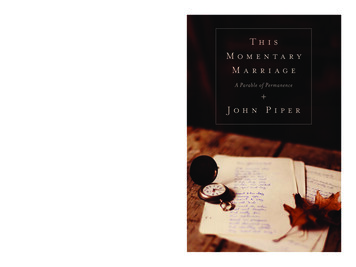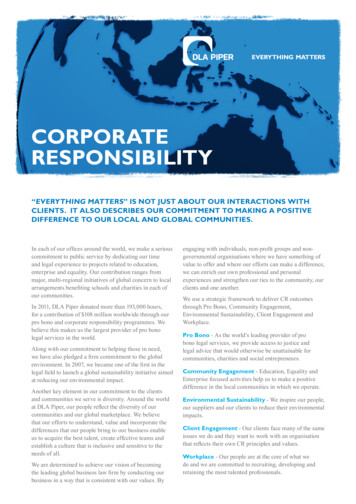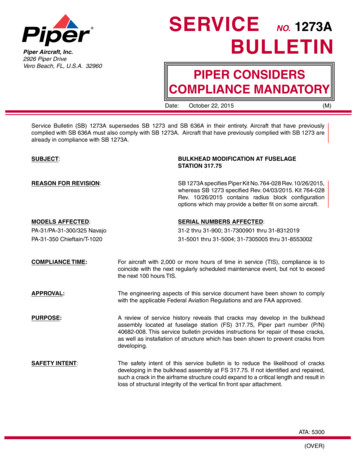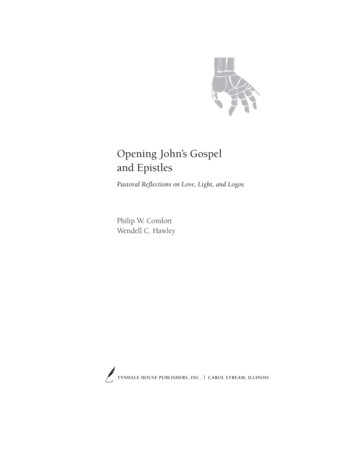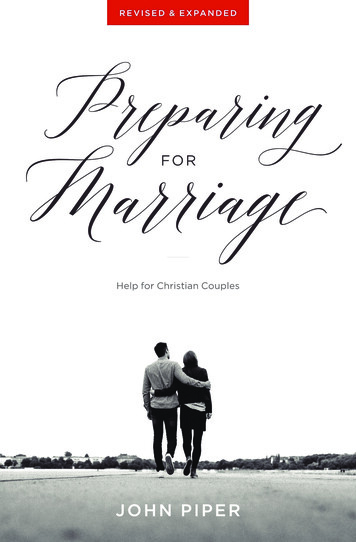
Transcription
JOHN PIPER
Preparing for Marriage: Help for Christian CouplesRevised and Expanded EditionCopyright 2018 by Desiring GodPost Office Box 2901Minneapolis, MN 55402Published for Desiring God byAll rights reserved. No part of this publication may be reproduced,stored in a retrieval system, or transmitted in any form by any means,electronic, mechanical, photocopy, recording, or otherwise, withoutthe prior permission of the publisher, except as provided for by USAcopyright law.Print/PDF 978-1-941114-58-2Mobipocket 978-1-941114-59-9ePub 978-1-941114-60-5Printed in the United States of AmericaUnless otherwise indicated,Scripture quotations are from the ESV Bible(The Holy Bible, English Standard 2001 by Crossway).Scripture quotations marked NAS or NASB are taken from the NewAmerican Standard Bible (NASB), Copyright 1960, 1962, 1963, 1968,1971, 1972, 1973, 1975, 1977, 1995 by The Lockman Foundation. Used bypermission.All emphases in Scripture quotations have been added by the author.
Contents Editor’s Preface31. Don’t Waste Your Engagement72. Weddings: Don’t Break the Bank133. Husbands Who Love Like Christ,and the Wives Who Submit to Them194. Sexual Relations in Marriage315. Let Marriage Be Held in Honor among All456. The Surpassing Goal: Marriage Lived for theGlory of God59 Appendix 1: Some Questions to Ask When Preparingfor Marriage71 Appendix 2: The Christian Virtue of Hospitality:A Christ-Exalting Strategy of Love in the Last Days77
Editor’s PrefaceGetting to know that special someone naturally includeslearning about family and friends, education and athletics, favor ite pastimes, and your hopes and dreams. Ideallyyou’ll ask each other all kinds of questions, some vital andsome trivial, and you’ll talk about life’s best moments andworst, the brightest places in your background and thedarkest.But what about God? What is his role in your relationship? What do each of you believe about him, andhow do you understand his dream for marriage—for yourmarriage?At Desiring God, one of our most accessed pagesonline is a set of questions John Piper put together forcouples preparing for marriage (an updated versionappears in Appendix I). You’ll find many of the typicalquestions here—about friends and entertainment andlifestyle and children, and many people have found that
4P R EPARI NG FO R M ARRI AGEJohn’s way of putting these questions helps get right atsome pretty deep stuff.But you’ll find other questions here, too—abouttheology, worship and devotion, and the roles of husbandand wife—ques tions that far too many couples don’tthink to ask. When preparing for marriage, or even in justbeginning to con sider it, it can be immensely helpful tohave the perspective of someone like John Piper, not onlya seasoned husband of nearly 50 years, but also a sea sonedpastor, careful thinker, and faithful theologian.This is a short book. Our vision for it is humble.Our hope is that a few couples—whether dating andconsidering marriage, or engaged and preparing for marriage—would find some benefit here, getting to know eachother better in some of life’s most significant matters, andbecoming more fit to discern God’s leading for their lives.But John has more to offer than just the pre-marriagequestions. We have six short chapters we think you willfind helpful together on the road to marriage. Chapter 1includes John’s counsel about engagement, chapter 2 aboutwedding planning (and finances). Chapter 3 providesinvaluable instruction about the beautiful, complementarydynamic the Bible teaches between husband and wife.Sexual relations in marriage is the topic of chapter4. (We know some of you may be flipping straight to thatone, now that you know it’s there. That’s okay. Do readthe rest of the book when you can!) Here there is so muchpotential for pleasure, and so much potential for pain.Don’t shy away from giving the topic of sex good consideration and honest discussion during your engagement.Then, in chapter 5, John helps us ponder how wecan guard our marriages in a day in which they are under
E D I TO R’S P REFACE5assault from every side. Finally, chapter 6 is based onperhaps John Piper’s single most important message onmarriage. There he goes more macro than many of ushave ever dared to go in thinking about what marriageis, and what God designed it for. This is a glorious, true,life-changing vision.After John’s long list of pre-marriage questions todiscuss, the second appendix is about mission together.Marriage is for mission, too. In particular, the focus here ison hospital ity. It’s a lightly edited sermon from the seriesthat became the book This Momentary Marriage: A Parableof Permanence, which is where we’d send you to learnmore about marriage fol lowing this book. (We’d also wantto point you to a 30-day devotional for young marriedcouples called Happily Ever After: Finding Grace in theMesses of Marriage, by John Piper and other contributors todesiringGod.org.) For Christians, talking about ministrytogether, including hospitality (literally, in the New Tes tament, “love for strangers”) is essential preparation.Marriage is big. What you’re considering or preparing for here is no trifle. Don’t imagine you can just addmarriage as another layer to an already busy life. Marriagedemands a full restart. Reevaluate your commitments,check your priorities, rethink your normal. This book andother resources like it can help. It will be well worth yourtime to ask difficult questions and think hard about theanswers. For your joy, the good of others, and the glory ofthe church’s Groom.David MathisExecutive EditordesiringGod.org
1Don’t Waste YourEngagementThis chapter has been adapted from Episode987 of Ask Pastor John, a daily audio program inwhich John Piper answers tough theological andpastoral questions.“Pastor John, I’m getting married in exactly 100 days. I’m 21 yearsold, and my bride-to-be is 18. I’m excited to take on the role ofloving a woman like Christ did the church, but as the day drawsnearer and nearer I am made more and more aware of my needfor wisdom and help to become a husband capable of loving awife well. I’ll be re-listening to all the episodes on marriage. Butwith all that being said, what advice do you have for me? Whatare the most important questions we need to ask—and likely arenot—due to the rushing excitement of the engagement phase?”
8P R EPARI NG FO R M ARRI AGEDiscuss the Hard Things NowThe more issues you can talk about together before marriage, the better. It is far more frustrating and threateningto think of something after you are married that youshould have talked about beforehand. So don’t shy awayfrom any issue or conversation with your fiancée becauseyou think this is a good time to try to avoid conflict. Nowis the time to have every conflict you can have that mightcome up later. If you think that you can dodge conflictsnow so that there will be a more opportune time later, youare mistaken. If you think you should avoid conflicts nowbecause a blissful engagement is the path to a blissfulmarriage, you are badly mistaken. Instead, this is whatengagement or courtship is designed for: maximum exposure to what each of you thinks, believes, feels, and does,whether habitually or occasionally. No secrets, nothingheld back. You don’t want marriage to be based on ignorance, but on trust, in the face of all truth.While the topics covered in the six chapters of thisbook could prompt hours of fruitful conversation(and possibly some constructive conflict along theway), don’t miss Appendix 1, either. There you willfind more than fifty short, specific questions, ineleven categories, that many couples have foundhelpful.Spiritual LeadershipThe next thing I would say is that these are golden monthsin which to set patterns of spiritual leadership. Take the
DO N’T WASTE YO UR E NGAGE M EN T9initiative to read the Bible with your bride-to-be, to prayand think and study and talk together with her about allkinds of biblical and spiritual realities. Make sure the twoof you are sufficiently on the same theological page. Thatis not an artificial or secondary expectation. If the two ofyou are going to pull together shoulder-to-shoulder inmarriage for some great purpose—which is what marriageis for—you must be pulling in the same direction. That is,you must be seeing God in the same way and seeing Christand seeing the Holy Spirit and seeing faith and seeing loveand salvation and heaven and hell and Satan and sin andholiness and obedience—seeing all these things in essentially the same way. Otherwise, pulling together in harnesswill start to become very painful as you jerk each otheraround in different directions spiritually. What’s morelikely, though, is something even worse: that in your marriage you gradually just stop talking about spiritual things.So take the initiative and go deep into every dimension ofspiritual life that you can in these days.Individual Godward FellowshipAnd for both of you, you must be aware that your own personal fellowship of faith and joy and hope and obediencetoward Jesus is foundational for the survival and flourishing of your marriage. The marriages that I have seenunravel, unravel in tandem with the unraveling of spiritualreality. One or both of the members of these couples fallsaway from Jesus to one degree or another. When thathappens, their spiritual resources for handling normal,everyday conflicts start to evaporate.Don’t just think that what you do together strengthens
10P R EPARI NG FO R M ARRI AGEthe marriage. Far more important—and this may soundlike an overstatement, but I’ve thought about it and Iam going to stick by it—far more important is what youdo apart from each other as each of you meets Jesus andconsecrates yourself afresh, over and over, so that yourdevotion to Christ is absolutely unshakable, and yourexperience of him is profoundly satisfying. I mean separately, personally, as individuals before Christ. When twopeople operate out of that individual profundity, the marriage will endure. And not only endure, but flourish withjoy and fruitfulness.Expressions of Love and CareFinally, of all the hundreds of things that need to be saidand could be said, here is one last thing that must be said—to both of you, but with special emphasis to you as theman in this relationship: don’t assume that your affectionfor your bride-to-be is known and felt by her. Instead, putit on your lips over and over again, every day. Commit todoing that, from today until the end of your life together.Find fresh ways to say it—not just show it, but say it.Lots of married men think, Well, I show it. I earn aliving. I guard her. I protect her Yes, that’s all well andgood. Show it. Do the kinds of deeds she loves for you todo. But don’t just do things. Say things. Lavish her (andin some different ways when you’re married!) with expressions of delight and appreciation and admiration andaffection and enjoyment. In your wedding vows, I hopeyou are going to promise to cherish her above all othersand forsake everyone else, cleaving to her alone. Put thatcherishing and that cleaving into words every day. This will
DO N’T WASTE YO UR E NGAGE M EN T11pay dividends of great joy and deep bonding of soul at awonderfully profound and happy level.That said, one caveat: remember that there is awarning in the Bible not to stir up love until it satisfies(see Song 2:7). I think that means, among other things, youcan immerse yourself in the Song of Solomon in a premature and inappropriate way, because the language canturn you on in premature ways. But—I am going to riskit anyway and say this—go to that book and learn what Iam talking about here. Learn how to put into words, to herface, the cherishing that you feel for her. May God blessyou in this season of engagement.
2Weddings:Don’t Breakthe BankThis chapter has been adapted from Episode 875of Ask Pastor John.“Dear Pastor John, in a recent article, you wrote: ‘Pastors shouldlead the way in cultivating a church ethos where expensivefunerals (and weddings!) are not the norm.’ This is somethingI hadn’t given much thought to before, and really appreciated.Thank you! I was hoping you could speak more directly on thetopic of expensive weddings. How can we design a ‘Christ-exalting, simple wedding’?”Word to PastorsI will make a plea to couples in a minute for courage to becounter-cultural in this regard—because that is what it’sgoing to take—but in that article I am mainly pleadingwith pastors. I want to see pastors take the initiative to
14P R EPARI NG FO R M ARRI AGEteach and preach and help to build a culture of simplicityin the church that makes the focus of marriage celebrations the Lord Jesus; the Christ-exalting meaning ofmarriage; the awesome importance of the vows; and thepreciousness of the people, the lovers—not the clothing,the flowers, the location, the music, and the whole production that can make the actual act of God in marriage seemlike an incidental prelude to the big, fancy party afterwards.That is sad, I think.But, of course, this is not an attack on joy. Just theopposite. It is a plea for drinking from the deepest poolsof joy, not the peripheral puddles of happiness. Godly poorpeople regularly have more joy than rich people. There isno correlation between expensive and joyful—none. Unlessit is this: more expensive means more hassle, more stress,more distraction—less joyful. This is a plea to leadersto cultivate an expectation of simplicity so that no onewith modest means—and that is a lot of people—feelsas though a simple wedding with a mints-and-nutsreception—no meal, no dance, just joy—is somehow lesshonoring to the Lord and the couple. It is tragic if we havecultivated a situation like that.Revolution in ResourcesHere is the underlying worldview. A decisive turn happened in redemptive history when Jesus came into theworld. The Old Testament was, by and large, a comeand-see religion, while the New Testament is largely ago-and-tell religion. That is why there is lavish expenditurein the Old Testament on the temple. Come see, from Egyptand from Ethiopia and from the ends of the earth! Come see
W ED D I NGS : D O N’T BRE AK TH E B A N K15this expensive temple that we have built! That’s why wealthwas seen so regularly as a sign of God’s blessing. But thathas all radically changed with the coming of the Son ofMan, who had no place to lay his head and told us to gorisk our lives to disciple the nations (see Matthew 8:20;28:19). We are not living in Old Testament times. This isnot a come-and-see religion, and Christianity doesn’t evenhave a geographic center. This is a go-and-tell religion.The coming of the new covenant has brought arevolution in the use of our resources. What governs ourlifestyle now is the effort to show that our treasure is inheaven and not on the earth. What governs us is the effortto maximize our giving to finish the Great Commissionand to love the hurting of the world. The New Testament is relentless in pushing us toward simplicity andeconomy for the kingdom and away from luxury and awayfrom affluence and away from finery, including luxuriousweddings.Just to give you a taste of what I mean when I say it isrelentless, consider a few Bible verses. Blessed are you who are poor, for yours is thekingdom of God Woe to you who are rich, for youhave received your consolation. (Luke 6:20, 24) They are choked by the cares and riches and pleasuresof life. (Luke 8:14) The Son of Man has nowhere to lay his head. (Luke9:58) Do not lay up for yourselves treasures on earth, wheremoth and rust destroy. (Matthew 6:19) I tell you, do not be anxious about your life Life [is]more than food and clothing. (Matthew 6:25)
16P R EPARI NG FO R M ARRI AGE Sell your possessions, and give to the needy. Provideyourselves with a treasure in the heavens. (Luke12:33) Any one of you who does not renounce all that he hascannot be my disciple. (Luke 14:33) How difficult it is for those who have wealth to enterthe kingdom of God! (Luke 18:24) Paul was “poor, yet making many rich.” He had“nothing, yet [possessed] everything.” (2 Corinthians6:10) We brought nothing into the world, and we cannottake anything out of the world. But if we havefood and clothing, with these we will be content. (1Timothy 6:7–8) You joyfully accepted the plundering of your property,since you knew that you yourselves had a better possession and an abiding one. (Hebrews 10:34)When Noël and I were married, she wore her mother’swedding dress. There were some small alterations made,but the cost was minimal. I wore my best and only Sundaysuit, and my best man wore his. Noël’s matron of honorwore a nice Sunday dress. We had an open Bible and across on the platform, just to show our values. Someoneplayed the church organ. My father preached. The churchprovided a reception in the fellowship hall: no meal, norefreshments, just a cake. For the honeymoon, I borrowedmy father’s car and we made the seven-hour drive to St.Petersburg, Florida, where we stayed in a single-storymotel on the beach.It was all simple. It was all full of joy. It was explosivewith happy expectation. Nobody borrowed any money.
W ED D I NGS : D O N’T BRE AK TH E B A N K17The Lord, the word of God, the vows, and the lovers werein the foreground, and God was honored. And all thesedecades later we are just as married as anybody. I thinkthat is a good idea.Truth and Beauty, in HumilityNow, let me stress again that there is a place for special:special dress, special expenditures, special beauty in thesimplicity of the Christian life. There is a place for beautyexpressed in that way. But what is happening in theevangelical church today, it seems to me, is that things arecareening out of control, and somebody needs to put thebrakes on. So I am pleading with pastors, especially. Letthe service and the word and the vows and the Lord andthe love be the main thing. There does not have to be ameal after the wedding—believe me, there doesn’t. Theredoesn’t have to be a dance. The reception doesn’t have tobe at an expensive hotel. There doesn’t have to be a paidquintet. Really, it doesn’t have to be.Besides pastors who lead on this, the church needsyoung people with backbone and radical Christian courageto stand against a culture and show in all humility whattruth and beauty and joy can look like at one fourth thecost and one fourth the anxieties and one fourth thestress—and double the focus on the glory of Christ andthe advancement of his kingdom. I pray that you twomight be among them.
EPHESIANS 5:21–33[Submit] to one another out of reverence for Christ. 22 Wives,submit to your own husbands, as to the Lord. 23 For the husbandis the head of the wife even as Christ is the head of the church,his body, and is himself its Savior. 24 Now as the church submitsto Christ, so also wives should submit in everything to theirhusbands. 25 Husbands, love your wives, as Christ loved thechurch and gave himself up for her, 26 that he might sanctify her,having cleansed her by the washing of water with the word, 27 sothat he might present the church to himself in splendor, withoutspot or wrinkle or any such thing, that she might be holy andwithout blemish. 28 In the same way husbands should love theirwives as their own bodies. He who loves his wife loves himself. 29For no one ever hated his own flesh, but nourishes and cherishesit, just as Christ does the church, 30 because we are members ofhis body. 31 “Therefore a man shall leave his father and motherand hold fast to his wife, and the two shall become one flesh.” 32This mystery is profound, and I am saying that it refers to Christand the church. 33 However, let each one of you love his wife ashimself, and let the wife see that she respects her husband.1 PETER 3:1–7Likewise, wives, be subject to your own husbands, so that evenif some do not obey the word, they may be won without a wordby the conduct of their wives, 2 when they see your respectfuland pure conduct. 3 Do not let your adorning be external—the braiding of hair and the putting on of gold jewelry, or theclothing you wear—4 but let your adorning be the hidden personof the heart with the imperishable beauty of a gentle and quietspirit, which in God’s sight is very precious. 5 For this is how theholy women who hoped in God used to adorn themselves, bysubmitting to their own husbands, 6 as Sarah obeyed Abraham,calling him lord. And you are her children, if you do good and donot fear anything that is frightening. 7 Likewise, husbands, livewith your wives in an understanding way, showing honor to thewoman as the weaker vessel, since they are heirs with you of thegrace of life, so that your prayers may not be hindered.
3Husbands WhoLove Like Christand the WivesWho Submitto ThemThe sections of Ephesians and 1 Peter on the precedingpage are essential passages for engaged or newly marriedChristian couples to become familiar with and to discuss,honestly and in detail. My goal in this chapter is to encourage that conversation by giving you plenty to talk about.Let’s start by jumping into the Ephesians passage atverse 31. It’s a quote from Genesis 2:24, “Therefore a manshall leave his father and his mother and hold fast to hiswife, and they shall become one flesh.” In the next verse,Paul looks back on this quote and says, “This mystery isprofound, and I am saying that it refers to Christ and thechurch.”Mystery of MarriageWhy is the coming together of a man and woman to formone flesh in marriage a mystery? Paul’s answer is this: the
20P R EPARI NG FO R M ARRI AGEmarriage union is a mystery because its deepest meaninghas been partially concealed, but is now being openlyrevealed by the apostle: “it refers to Christ and the church”(v. 32).So marriage is like a metaphor or an image or apicture or a parable that stands for something more thana man and a woman becoming one flesh. It stands for therelationship between Christ and the church. That’s thedeepest meaning of marriage. It’s meant to be a livingdrama of how Christ and the church relate to each other.Notice how verses 28–30 describe the parallel betweenChrist and the church being one body, and the husbandand wife being one flesh. “In the same way husbandsshould love their wives as their own bodies. He who loveshis wife loves himself. For no one ever hated his ownflesh, but nourishes and cherishes it, just as Christ doesthe church, because we are members of his body.” In otherwords, the one-flesh union between man and wife meansthat in a sense they are now one body, so that the carea husband has for his wife, he has for himself. They areone. What he does to her, he does to himself. Then Paulcompares this to Christ’s care for the church. Picking upnear the end of verse 29, he says the husband nourishesand cherishes his own flesh, “as Christ does the church,because we are members of his body.”Just as the husband is one flesh with his wife, so thechurch is one body with Christ. When the husband cherishes and nourishes his wife, he cherishes and nourisheshimself; and when Christ cherishes and nourishes thechurch, he cherishes and nourishes himself.If you want to understand God’s meaning for marriage, you have to grasp that we are dealing with an
H US BANDS AND WI VES21original and a copy; a reality and a metaphor; a truth anda parable. The original—the reality, the truth—is God’smarriage to his people, or Christ’s marriage to the church.And the copy—the metaphor, the parable—is a husband’smarriage to his wife. Geoffrey Bromiley says, “As Godmade man in his own image, so he made earthly marriagein the image of his own eternal marriage with his people”(God and Marriage, p. 43).Roles of Husbands and WivesOne thing to learn from this mystery is the roles ofhusband and wife in marriage. One of Paul’s points in thispassage is that these roles are not arbitrarily assigned, andthey are not reversible without obscuring God’s purposefor marriage. The roles of husband and wife are rooted inthe distinctive roles of Christ and his church. God meansfor marriage to say something, about his Son and hischurch, in the way husbands and wives relate to each other.We see this in verses 23–25. Verse 24 speaks to thewife about her half of the metaphor, and verses 23 and 25speak about the husband’s half of the metaphor. Wives,find your distinctive role as a wife in keying off the waythe church relates to Christ. “Now as the church submitsto Christ, so also wives should submit in everythingto their husbands” (v. 24). Then to husbands: find yourdistinctive role as a husband in keying off the way Christrelates to the church. “For the husband is the head of thewife even as Christ is the head of the church, his body, andis himself its Savior” (v. 23). “Husbands, love your wives, asChrist loved the church and gave himself up for her” (v. 25).
22P R EPARI NG FO R M ARRI AGERedeeming of Headship andSubmissionWhen sin entered the world, it ruined the harmony ofmarriage (see Genesis 1–3). Not because it brought headship and submission into existence, but because it twistedman’s humble, loving headship into hostile dominationin some men, and into lazy indifference in others. Andit twisted woman’s intelligent, willing submission intomanipulative obsequiousness in some women, and intobrazen insubordination in others. Sin didn’t create headship and submission; it distorted them and inclined themtoward being ugly and destructive. Now if this is true, thenthe redemption we anticipate with the coming of Christis not the dismantling of the original, created order ofloving headship and willing submission, but a recoveryof it from the ravages of sin. And that’s just what we findin Ephesians 5:21–33. Wives, let your fallen submissionbe redeemed by modeling it after God’s intention for thechurch! Husbands, let your fallen headship be redeemed bymodeling it after God’s intention for Christ!Therefore, headship is not a man’s right to commandand control. It’s a responsibility to love like Christ: to laydown your life for your wife in servant-leadership. Andsubmission is not slavish or coerced or cowering. That’snot the way Christ wants the church to respond to hisleadership: he wants it to be free and willing and glad andrefining and strengthening.So this passage of Scripture does two things: it guardsagainst the abuses of headship by telling husbands to lovelike Jesus; and it guards against the debasing of submissionby telling wives to respond the way the church does to Christ.
H US BANDS AND WI VES23Defining Headship andSubmissionIt may be helpful here to offer crisp definitions of headshipand submission as I understand them from this text. Headship is the divine calling of a husband to takeprimary responsibility for Christlike servant-leadership, protection, and provision in the home. Submission is the divine calling of a wife to honorand affirm her husband’s leadership, and help carry itthrough according to her gifts.I’ll offer some practical implications of these definitionsin a moment. But first let me say a word about a couple ofcommon objections.What about Mutual Submission?The ideas of headship and submission are not populartoday. The spirit of our society makes it very hard forpeople to even hear texts like this in a positive way. Themost common objection to the picture I just painted ofloving leadership and willing submission is that verse 21teaches us to be mutually submissive to each other, “submitting to one another out of reverence for Christ.”So one writer says, “By definition, mutual submission rules out hierarchical differences” (Gilbert Bilezikian,Beyond Sex Roles, p. 154). He is claiming here that if mutualsubmission is a reality between husband and wife, then it’sa contradiction to say the husband has a special responsibility to lead and the wife a special responsibility tosupport that leadership and help carry it through.
24P R EPARI NG FO R M ARRI AGEWhat shall we say to this? I will say that it is simplynot true. In fact, the writer himself says one page later that,“The church thrives on mutual subjection. In a Spirit-ledchurch, the elders submit to the congregation in beingaccountable for their watch-care, and the congregationsubmits to the elders in accepting their guidance” (p. 155).Later he even says, “The congregations submit to theirleaders by obeying” (p. 251). So we see that, when it comesto the church, he has no trouble acknowledging howmutual submission is possible between two groups, one ofwhich has the special responsibility to guide, and the otherof which has the special responsibility to accept guidance.And that’s right. There is no contradiction betweenmutual submission and a relationship of leadership andresponse. Mutual submission doesn’t mean that bothpartners must submit in exactly the same ways. Christsubmitted himself to the church in one way, by a kind ofservant-leadership that cost him his life. And the churchsubmits herself to Christ in another way by honoring hisleadership and following him on the Calvary road.So it is not true that mutual submission rules out thefamily pattern of Christlike leadership and church-likesubmission. Mutual submission doesn’t obliterate thoseroles; it transforms them.Does Head Even Refer to Leadership?One other common objection to the pattern of leadershipand submission is that head does not mean “leadership”at all. It means “source,” like a fountainhead or the headof a river (Bilezikian, pp. 157–162). By this view, to call ahusband the “head” of his wife wouldn’t mean he is to be aleader, but in some sense is her “source” or “fountainhead.”
H US BANDS AND WI VES25In fact, however, there are serious studies showingthat this was not a normal meaning for the word head inPaul’s day. But you’ll probably never read these technicalarticles, so let me try to show you something from theverses themselves that everyone can see.The husband is pictured as the head of his wife, just asChrist is pict
perhaps John Piper's single most important message on marriage. There he goes more macro than many of us have ever dared to go in thinking about what marriage is, and what God designed it for. This is a glorious, true, life-changing vision. After John's long list of pre-marriage questions to discuss, the second appendix is about mission .


